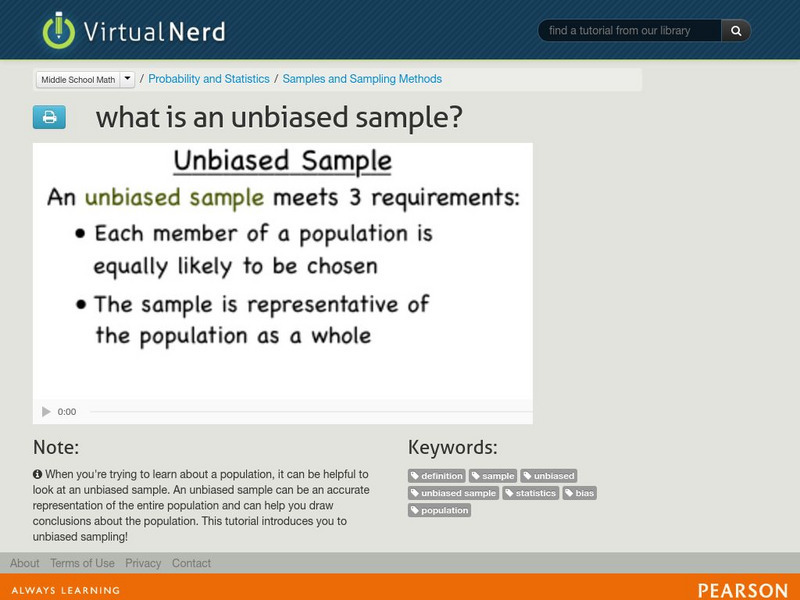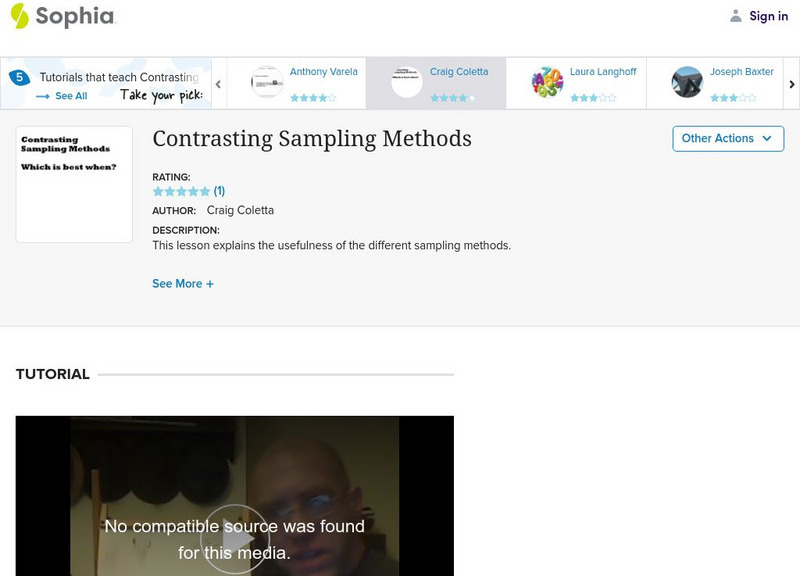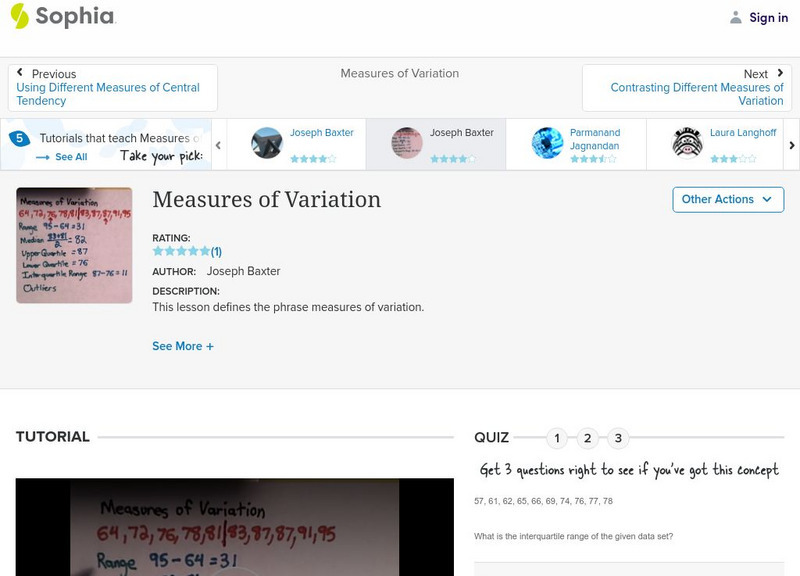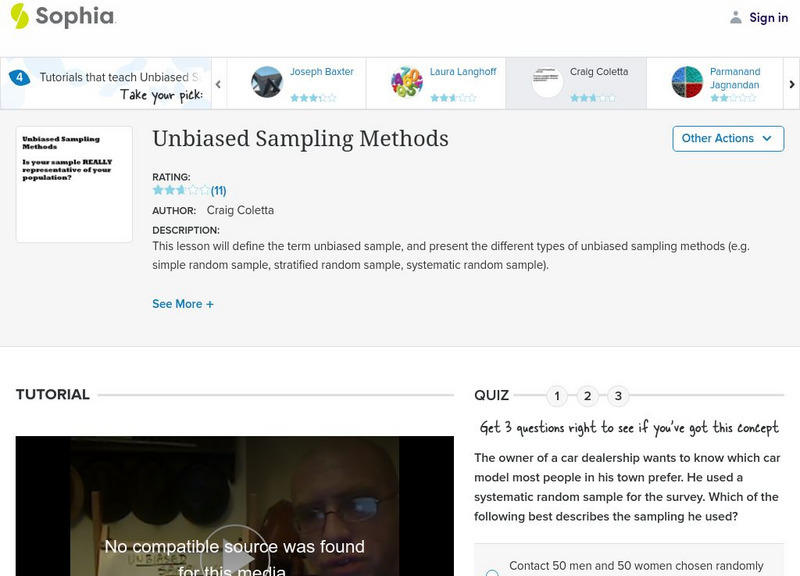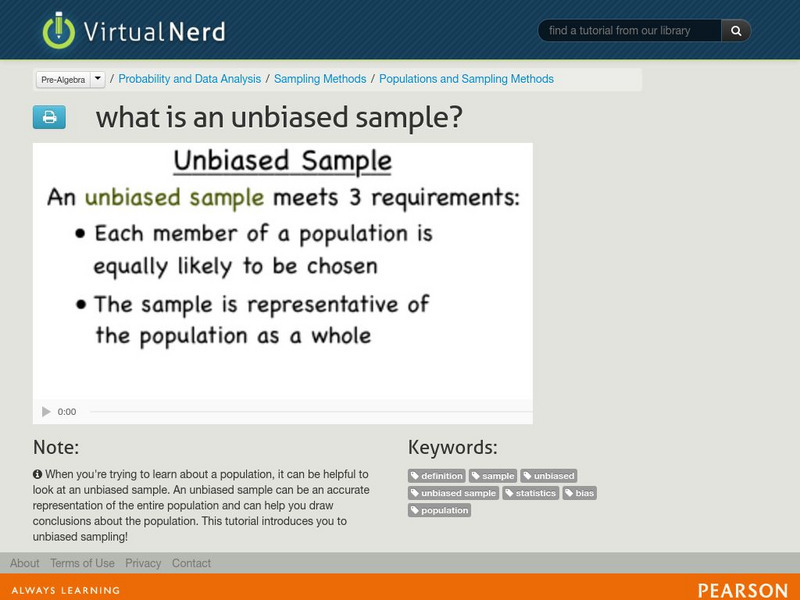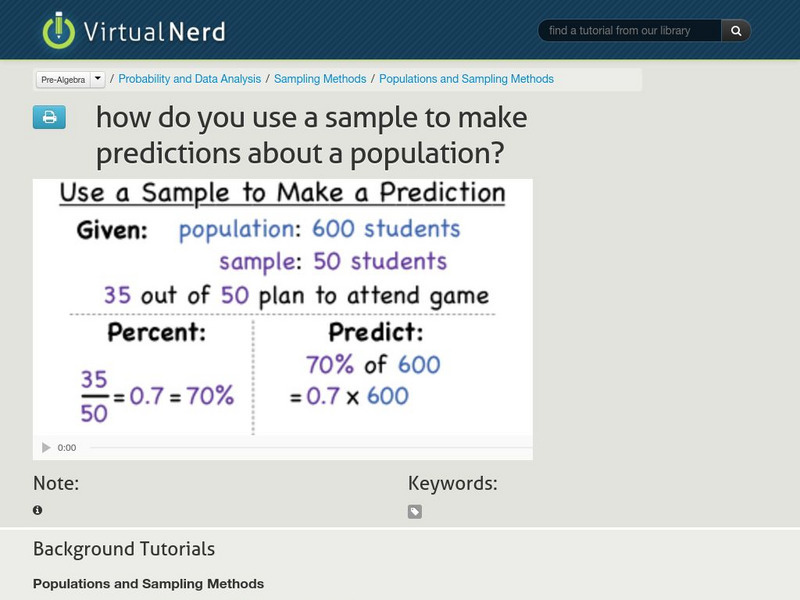Flipped Math
Sampling Methods
Pupils watch a video to learn about different types of sample design and how to use technology to create a random sample. They discover different types of bias that may happen due to the sampling design or the questions. Learners use...
PBS
Recognize and Represent Proportional Relationships between Quantities: Ratio, Proportion, Cross Multiply, and Divide
Review three video clips for one major concept. The resource contains three short clips to introduce the idea of ratios and proportions and how to solve a proportion. After watching the video, partners use their noses to push pom poms...
Crash Course
Measures of Spread: Crash Course Statistics #4
Sometimes the measures of center don't give us enough information. The spread of the data can tell statisticians much more about the data set. A video lesson, part of a statistics video series, describes different measures of spread such...
Crash Course
Mean, Median, and Mode: Measures of Central Tendency: Crash Course Statistics #3
If you have two feet, you have more than the average number of feet! Explore the meaning of the numbers of measures of central tendency of different data sets with the third of five lessons in a video statistics playlist. Using unique...
Virtual Nerd
Virtual Nerd: What Is an Unbiased Sample?
When you are trying to learn a particular characteristic of a large population, you need to be able to study an unbiased sample of that population to be able to draw accurate conclusions. Watch this video for an in-depth explanation. [5:04]
Loyola University Chicago
Math Flix: Survey Sampling Activity
This QuickTime movie discusses surveys and a sampling activity. A pdf worksheet is available by clicking on the hyperlink at the bottom of the page. As you watch and listen to the teacher and student interact it helps clarify the...
Sophia Learning
Sophia: Sampling & Predictions
Explore the relationship between sampling and predictions.
Sophia Learning
Sophia: Contrasting Sampling Methods
In order to accurately reflect collected data, the right type of sampling method needs to be determined. [7:04]
Sophia Learning
Sophia: Measures of Variation
Use data sets to determine the measures of variation. Check understanding with a quiz.
Sophia Learning
Sophia: Sampling Error and Sample Size: Lesson 4
This lesson will explain sampling error and sample size. It is 4 of 4 in the series titled "Sampling Error and Sample Size."
Sophia Learning
Sophia: Unbaised Sampling Methods
Determine the three types of random samples and how these types are considered unbiased sample methods. Assess learning with a quiz.
Sophia Learning
Sophia: Unbiased Sampling Methods
Unbiased sampling methods are explored in this video lesson. The tutorial describes and provides examples of random sampling, systematic sampling, and stratified sampling.
Virtual Nerd
Virtual Nerd: What Is an Unbiased Sample?
This tutorial introduces you to unbiased sampling which can be helpful when trying to learn about a population. [5:04]
Math Mammoth
Math Mammoth: Measures of Statistical Variation: A Beginner Lesson
A lesson in how to calculate measures of variation, including the range, the interquartile range, and the mean absolute deviation, and what each of these terms mean. [9:59]
Virtual Nerd
Virtual Nerd: How Do You Use a Sample to Make Predictions About a Population?
Watch this tutorial to discover how to use a sample to make a prediction about a population. [5:16]
Loyola University Chicago
Math Flix: Survey Sampling Methods
This QuickTime movie discusses surveys and sampling methods. A pdf worksheet is available by clicking on the hyperlink at the bottom of the page. As you watch and listen to the teacher and student interact it helps clarify the thinking...
Sophia Learning
Sophia: Measures of Variation: Lesson 7
This lesson will introduce measures of variation. It is 7 of 9 in the series titled "Measures of Variation."
Sophia Learning
Sophia: Sampling and External Validity: Lesson 6
This lesson discusses the relationship between sampling and external validity. It is 6 of 6 in the series titled "Sampling and External Validity."
Sophia Learning
Sophia: Sampling and Replacement: Lesson 1
This lesson introduces the concept of sampling with and without replacement and how it affects probability. It is 1 of 4 in the series titled "Sampling and Replacement."
Sophia Learning
Sophia: Sampling With or Without Replacement: Lesson 4
This lesson will explain sampling with and without replacement. It is 4 of 4 in the series titled "Sampling With or Without Replacement."
Sophia Learning
Sophia: Z Test for Population Means: Lesson 3
This lesson will explain hypothesis testing when the population standard deviation (sigma) is known. It is 3 of 5 in the series.
Sophia Learning
Sophia: Z Test for Population Means
Calculate z-statistic of a population mean. [9:44]
Sophia Learning
Sophia: Measures of Variation: Lesson 9
This lesson will introduce measures of variation. It is 9 of 9 in the series titled "Measures of Variation."




